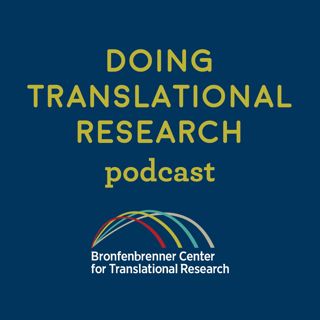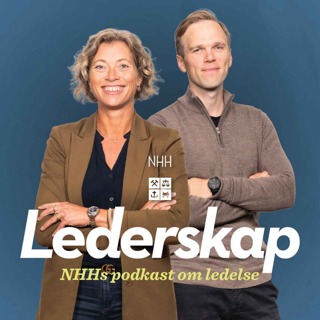
Ep. 48: Better Care for Traumatized Children with Deborah Sellers, Cornell University
This episode we hear from Deborah Sellers, director of research and evaluation for the Residential Child Care Project (RCCP) in the BCTR. Much of RCCP's work involves training staff in residential facilities and schools worldwide to respond to traumatized children in crisis without further traumatizing the child. Through her work in RCCP, Sellers helps design research studies that answer the right questions to guide decisions and uses data to evaluate how facilities can improve child safety. Deborah Sellers is director of research and evaluation for the Residential Child Care Project (RCCP) in the Bonfenbrenner Center for Translational Research. She facilitates research and evaluation activities in RCCP by identifying new avenues for research, supporting the development of new proposals, monitoring and/or assisting with data collection, processing, and analyses, and writing manuscripts for publication. Dr. Sellers also oversees the data collection efforts associated with the implementation of RCCP's Children and Residential Experiences (CARE) and Therapeutic Crisis Intervention (TCI) programs. Dr. Sellers has extensive experience in research and evaluation design, the design and implementation of survey research, and the analysis of quantitative data as well as data collection, processing and analysis in substantive areas including chronic illness, end-of-life care, organ donation, adult and adolescent health promotion and foster as well as residential care for children.
25 Okt 202124min

Ep. 47: Supporting Whole Families with Laura Tach and Elizabeth Day
Laura Tach and Elizabeth Day of Cornell Project 2Gen join Tony to talk about two-generation approaches to helping families thrive. They discuss why addressing the needs of both children and adults in a single family is a more effective way to create positive outcomes. Project 2Gen has extensive connections in communities and the court system. These partners have helped form the research that then benefits vulnerable families. Laura Tach is an sssociate professor of policy analysis and management and sociology (by courtesy) at Cornell University. Her research and teaching interests focus on poverty and social policy. Together with Rachel Dunifon, she co-directs Cornell Project 2Gen, an initiative of the Bronfenbrenner Center for Translational Research. Project 2Gen serves as a hub for research, policy and practice that supports vulnerable caregivers and children together. Elizabeth Day is assistant director for policy engagement for Cornell Project 2Gen and an engaged learning associate with the Cornell Institute for Public Affairs. Her research focuses on bridging research and policy, with a particular focus on adolescent well-being and family policy at the state level.
25 Okt 202123min

Ep. 46: A Career Creating Change with Jutta Dotterweich, Cornell University
Tony welcomes Jutta Dotterweich to reflect on her career with Act for Youth. Jutta retired in June after 22 years with the Bronfenbrenner Center for Translational Research. Jutta received her MA in Psychology, Westfaelische Wilhelms University in Muenster, Germany in 1979. She has years of professional, community-based experience in the mental health and human services field in New York State and New Jersey. Jutta started as an Extension Associate at the Bronfenbrenner Center for Translational Research in 1999; working with centers on training and curriculum development in the areas of collaboration, community building, positive youth development, adolescent sexual and mental health, and implementation science.
22 Sep 202126min

Ep. 45: Everyone Can Find Their Life's Purpose with Patrick Hill, Washington University
This is the debut episode of the new BCTR director Tony Burrow! Tony welcomes Patrick Hill, who studies how individuals consider and ultimately commit to a purpose for life. Hill notes that we all face difficult times where we have to decide who we are and where we want to go. He's interested in helping people find direction at times of uncertainty by determining what the best choices are for them by identifying their own direction in life. He and Tony also discuss the lifespan perspective of his work and his current research in retirement communities. Patrick Hill is an associate professor of psychological and brain sciences at Washington University in St. Louis. His research focuses on understanding how dispositional traits predict and shape trajectories of healthy aging. Hill's current research is interested in how individuals explore options for and ultimately commit to a purpose for life, and how having a sense of purpose predicts important life outcomes. In addition, he examines the lifespan development of pro-social personality characteristics, such as dispositional gratitude and forgiveness, as well as how these traits influence relationship outcomes. His research program considers these questions with the intent of promoting healthy development from adolescence into older adulthood. Doing Translational Research is produced by Carrie Chalmers.
15 Jun 202131min

Ep. 44: Who Will Get Shot and How Do We Stop It? with Andrew Papachristos, Northwestern University
In Chris' final episode as Doing Translational Research host and director of the BCTR, he talks to his friend and colleague Andrew Papachristos, a professor of sociology doing translational criminology. How can social science help identify who will become a victim of gun violence and how to best intervene? Chris and Andy discuss this as well as Andy's path to academia, the biggest barrier in translational work and Andy's approach to mentoring graduate students. Andrew V. Papachristos is a professor of sociology and the director of the Northwestern Neighborhood & Network Initiative. Papachristos aims to understand how the connected nature of cities—how their citizens, neighborhoods and institutions are tied to one another—affect what we feel, think, and do. His main research applies network science to the study of gun violence, police misconduct, illegal gun markets, Al Capone, street gangs and urban neighborhoods. He is also in the process of completing a manuscript on the evolution of black street gangs and politics in Chicago from the 1950s to the early 2000s. Papachristos is also actively involved in policy-related research, including the evaluation of gun violence prevention programs in more than a dozen U.S. cities. Hosted by Christopher Wildeman, director of the Bronfenbrenner Center for Translational Research at Cornell University. Produced and edited by Carrie Chalmers.
15 Mai 202123min

Ep. 43: COVID-19 in Prisons with Lauren Brinkley-Rubinstein, University of North Caroliina
Chris welcomes Lauren Brinkley-Rubenstein, assistant professor of social medicine at the University of North Carolina—Chapel Hill. Their wide-ranging conversation covers: the definition of social medicine, how COVID-19 more greatly impacts people in prisons and jails*, of course they cover her work with community partners, and there's a ghost named Kim. Yes, a ghost. *This episode was recorded in May, so covid numbers mentioned will have changed since then. Lauren Brinkley-Rubinstein is an assistant professor of social medicine at the University of North Carolina—Chapel Hill, as well as a core faculty member in the UNC Center for Health Equity Research. Dr. Brinkley-Rubinstein’s research focuses on how incarceration can impact health outcomes. She is the PI of a recently funded NIMHD R01 cohort study relevant to pre-exposure prophylaxis among people on probation and parole and the MPI of a NIDA Justice Community Opioid Innovation Network Clinical Research Center grant that will include the implementation and evaluation of opioid overdose prevention programs in community supervision settings in Rhode Island, Philadelphia, and Brunswick County North Carolina. This podcast is produced by Carrie Chalmers
15 Jul 202021min

Ep. 42: Youth are Assets, not Problems with Jane Powers, Cornell University
This month we hear from our own Jane Powers, project director of ACT for Youth. Jane and Chris get into the history and work of ACT, changing communities to be better environments for young people, building capacity in practitioners, the strength of partnerships with diverse perspectives and Jane's life examining adolescent development. Jane Powers, Ph.D. is a researcher based at Cornell University's Bronfenbrenner Center for Translational Research. She is project director for Assets Coming Together (ACT) for Youth Center for Community Action which connects youth development research to practice, provides training and technical support, evaluation assistance and resources to communities and youth serving programs across New York State. Her research expertise includes positive youth development, child abuse and neglect, youth homelessness, violence prevention and program evaluation. She is interested in the application of knowledge to practice, and in translating research to improve environments for children, youth and families.
12 Jun 202019min

Ep. 41: Conflicting Policy Responses to Violence with Tasseli McKay, Research Triangle Institute
In our first episode recorded in coronavirus separation, Chris speaks with Tasseli McKay, a social science researcher in the division for applied justice research at Research Triangle International. They discuss the most common acts of violence: partner violence; and the interplay of family violence in the context of mass incarceration. Tasseli notes how government systems, often at odds with each other, economically hobble families and are dangerous in other ways. They discuss how programs need to understand the different causes of violence and design programs accordingly. Tasseli also praises her community partners' vast knowledge, which makes her work possible and meaningful. Tasseli McKay is a social science researcher with more than a decade of experience in public health research. Ms.McKay’s research examines intimate partner violence in marginalized communities, couple and family relationships in the context of justice system involvement and strategies for improving health coverage and access to care among justice-involved persons. She has extensive experience in study design and instrument development, qualitative and quantitative analysis and dissemination of findings through articles, issue briefs, technical reports and presentations. Doing Translational Research is produced by Carrie Chalmers.
13 Mai 202026min





















